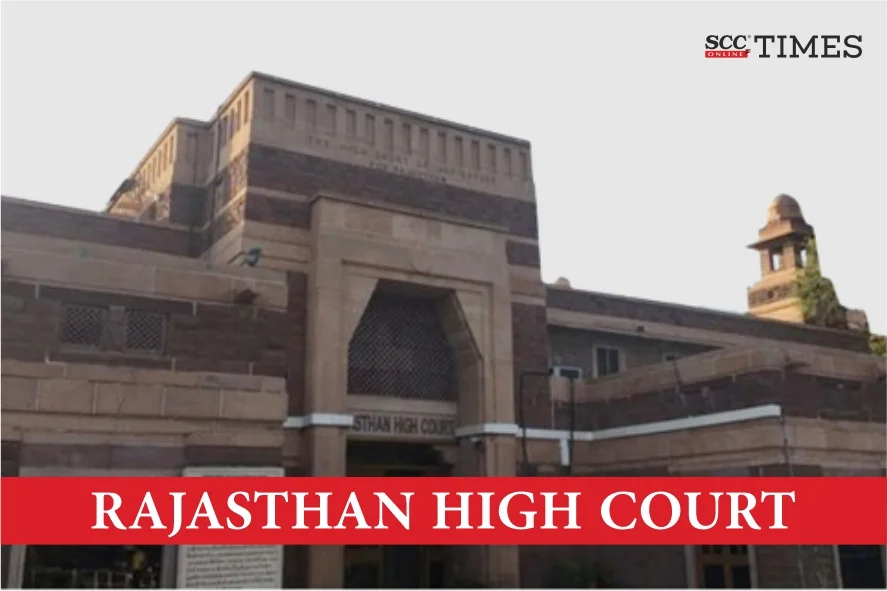Rajasthan High Court: In a criminal petition seeking quashment of FIR filed by Sub-Inspector based on a report that the petitioner attempted to forcibly enter the Mahakaleshwar Mahadev Ji Siddh Dham Temple by cutting a lock on the door, a single-judge bench of Arun Monga, J., held that “every citizen has the right to access the temple and offer prayers” and quashed the FIR and all consequential proceedings as the petitioner’s actions prima facie did not constitute any criminal offense.
“A temple is a public place of worship, accessible to all citizens regardless of caste, creed, or social standing. Restricting access to such a place by erecting barricades or locks by private Trustees violates the fundamental right of every individual to practice and propagate their religion, as guaranteed under Article 25 of the Constitution of India.”
In the instant matter, the Superintendent of Police, Udaipur, received a complaint alleging chaos at the Mahakaleshwar Mahadev Ji Siddh Dham temple. Following the complaint, a Sub-Inspector recorded witness statements and reviewed a video, which purportedly showed the petitioner and others attempting to forcibly enter the temple by cutting a lock. Based on this information, an FIR was registered against the petitioner for offences under Sections 448 (house-trespass), 427 (mischief), and 143 (unlawful assembly) of the Penal Code, 1860 (IPC).
The petitioner contended that her intent was to access a public place of worship, which does not constitute a criminal act. It was contended that there was no evidence of damage, violence, or intent to disrupt public order. The petitioner argued that the barricades set up by the Trustees of the temple unconstitutionally restricted access to the temple, thereby violating the fundamental right to worship under Article 25 of the Constitution of India. It was further contended that the Trustees, being private individuals, cannot restrict access to a public place of worship based on caste or any other discriminatory grounds.
On the other hand, the respondent (Temple Trust) claimed that the barricades were necessary to manage worshippers and prevent chaos. They presented photographs allegedly showing the petitioner using force against the barricades.
The Court noted that the petitioner’s primary objective was accessing a place of worship, which is a lawful act. The Court noted that the video evidence did not show the use of force or any damage to property. It was noted that the petitioner’s actions were confined to crossing a barricade, which does not constitute criminal trespass or mischief. The Court found no evidence of a group with a common intent to commit an illegal act, as required for the offence of unlawful assembly.
The Court stated the petitioner’s actions of attempting to cross barricade did not constitute house-trespass, mischief, or unlawful assembly as there was no evidence of criminal intent. The Court held that the FIR did not establish any prima facie case against the petitioner. The Court noted that “the FIR appears to be a clear abuse of the legal process, initiated with ulterior motives.” The Court further noted that the Trust did not itself file the complaint and that the FIR was registered by a Sub-Inspector who claimed to be an informer raises questions about the credibility and genuineness of the complaint.
The Court asserted that a temple is a public place of worship, restricting access through barricades violates the right to religious practice guaranteed under Article 25 of the Constitution of India, and therefore, any restrictions imposed by the Trustees are unlawful. The Court stated the public nature of temples and the rights of citizens, particularly from marginalized groups, to access such places of worship without discrimination.
“The Trustees, while managing the affairs of the temple, cannot act in a manner that deprives any or certain section of society, particularly the marginalized, of their right to worship.”
The Court emphasised that the petitioner’s Scheduled Caste background and the historical exclusion of marginalized communities from religious institutions cannot be overlooked. The Court stated that denying access to the temple could be interpreted as caste-based discrimination, which contravenes constitutional principles of equality.
The Court quashed the FIR, as well as all consequential proceedings. The Court also dismissed all pending applications related to the case.
[Sapna Nimawat v. State of Rajasthan, 2024 SCC OnLine Raj 2954, Decided on 10-09-2024]
Advocates who appeared in this case :
Mr. Tushar Moad, Counsel for the Petitioners
Mr. H.S. Jodha, PP, Counsel for the Respondent
Mr. Kailash Khatri, Counsel for the Respondent 2








